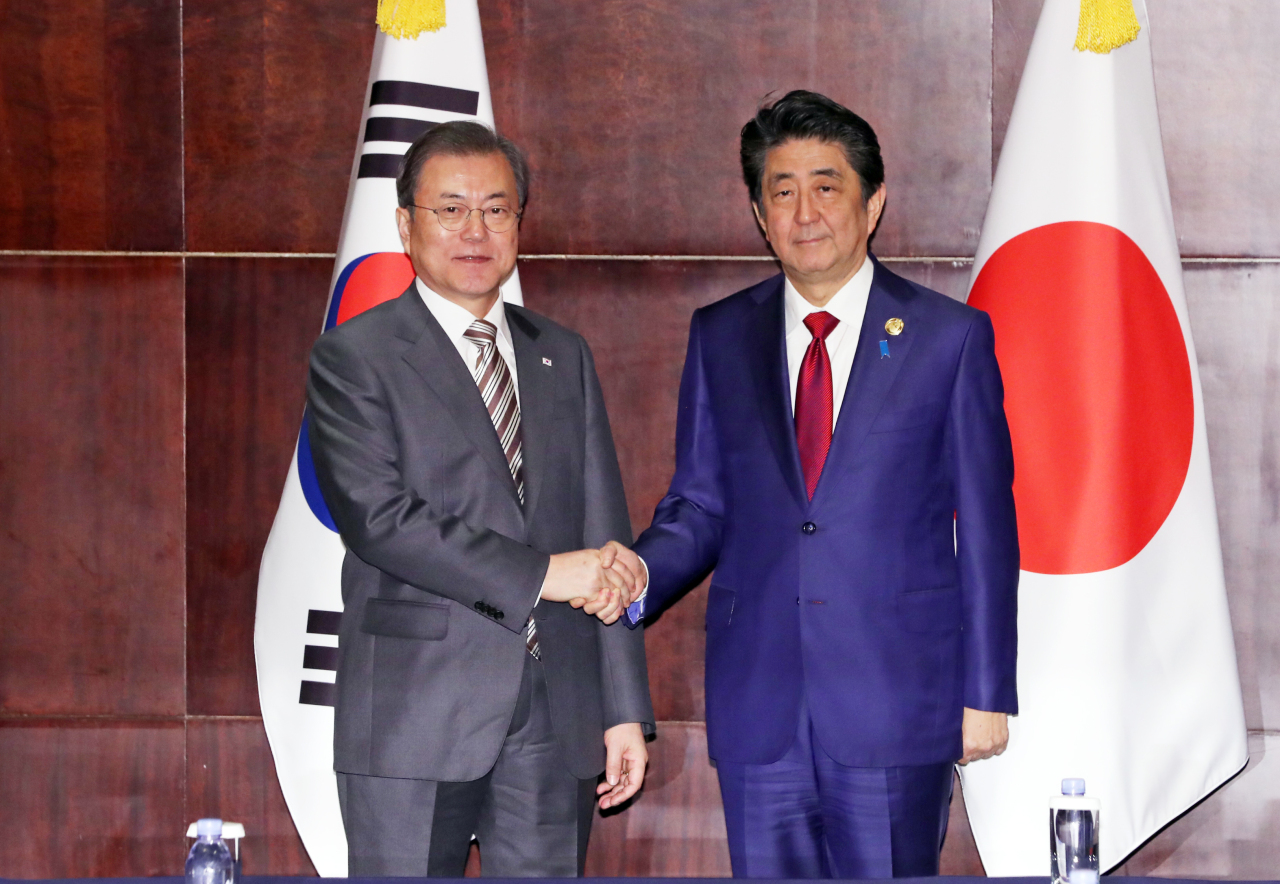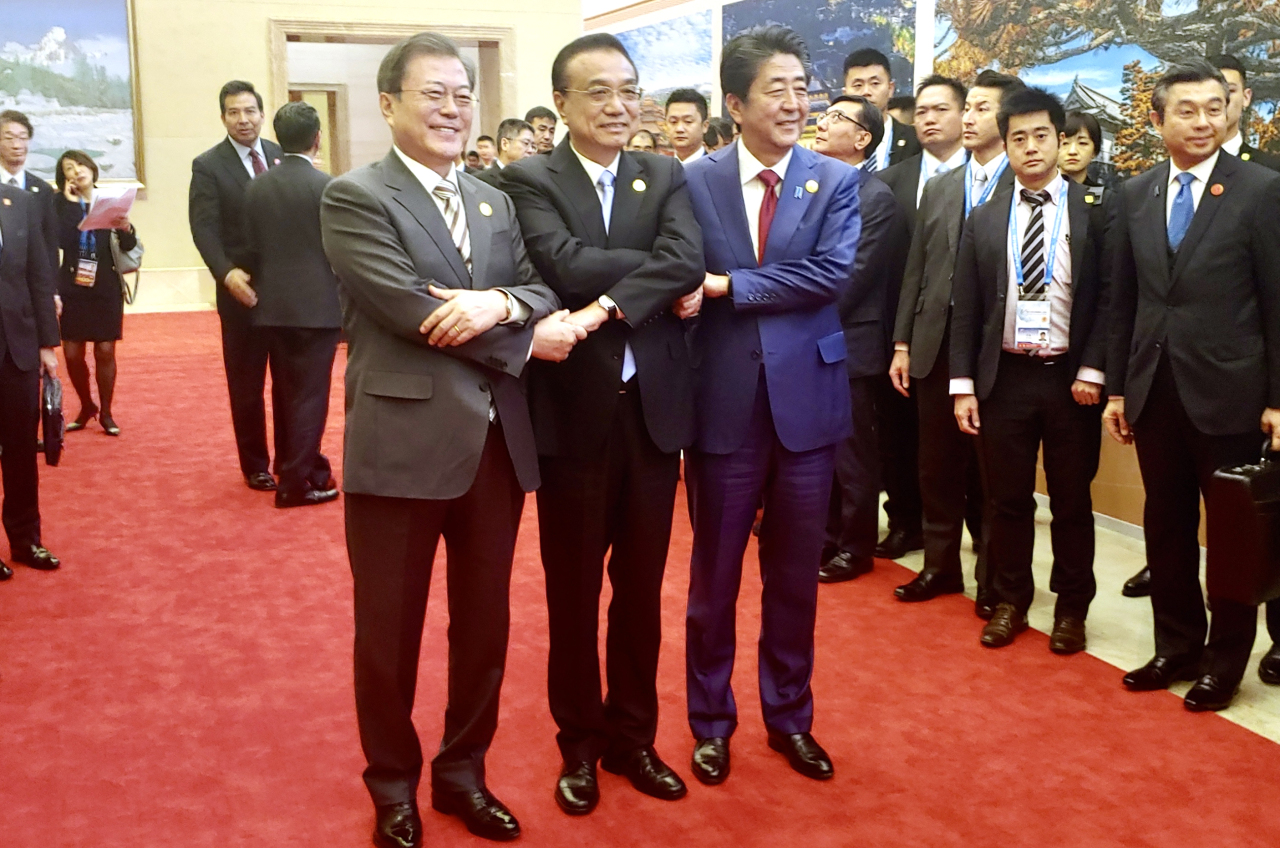President Moon Jae-in and Japanese Prime Minister agreed to resolve the forced labor and trade issues through dialogue at a bilateral summit held in China, Seoul’s presidential office said Tuesday.
At the meeting -- held on the sidelines of South Korea-China-Japan trilateral summit held in the city of Chengdu, Sichuan province -- Moon and Abe stressed the importance of dialogue, but failed to narrow differences over outstanding issues.
“(Korea and Japan) confirmed the differences in their positions over the forced labor issue, but agreed on the need to resolve it through dialogue,” Cheong Wa Dae spokesperson Ko Min-jung said.
Ko also quoted Moon as saying that Japan’s trade-related measures against Korea must be reverted to the situation before July 1. In July, Japan removed Korea from the whitelist of trade partners, and imposed tougher regulations on importing key semiconductor-related materials to Korea.
 |
President Moon Jae-in and Japanese Prime Minister Shinzo Abe pose before summit meeting in Chengdu, Sichuan Province, China on Tuesday. Yonhap |
According to Ko, Moon and Abe also discussed security issues surrounding the Korean Peninsula, and stressed the importance of Korea-Japan, and Korea-Japan-US cooperation.
Earlier in the day, Moon and Abe sat down with Chinese Premier Li Keqiang, and agreed to work together to facilitate progress in US-North Korea dialogue, and for establishing peace on the Korean Peninsula.
“Korea, China and Japan agreed to continue close communication and cooperation for denuclearization and permanent peace of the Korean Peninsula,” Moon said in the joint address after the trilateral summit held in China’s Chengdu in Sichuan province.
 |
President Moon Jae-in, Chinese Premier Li Keqiang and Japanese Prime Minister Shinzo Abe pose for a photograph after the trilateral summit in Chengdu, Sichuan Province, China on Tuesday. (Yonhap) |
“We shared the view that peace on the Korean Peninsula is in line with the interests of the three countries, and to work together to bring about real progress in denuclearization and peace through North-US dialogue.”
At the summit, Moon, Chinese Premier Li Keqiang and Japanese Prime Minister Shinzo Abe adopted a vision outlining trilateral cooperation for the next 10 years, which Moon described as a “new milestone in opening a new era of peace and prosperity in East Asia.”
In his address, Moon also said that he and the other leaders agreed to increase cooperation in areas “directly linked to the lives of the people, for the happiness of the three countries’ citizens.”
According to Seoul’s presidential office, these areas include economic, social and environmental issues -- including addressing air pollution.
Moon and the other leaders also agreed to cooperate in establishing open and reciprocal trade conditions, and to increase cooperation in science and technology, Cheong Wa Dae said.
Moon was also set to hold a bilateral summit with Abe later in the day. The meeting, Moon’s first official summit with Abe in 15 months, has raised hopes for mending strained diplomatic relations.
While Abe echoed Moon in pledging trilateral cooperation in North Korean issues, the Japanese leader emphasized the maintaining pressure, and for the North to comply with the international community.
“North Korea’s repeated ballistic missile launches are violation of UN Security Council resolutions, and posing grave threat to the region. The three nations’ shared stance is that UN Security Council resolutions must be strictly carried out,” Abe said.
The Japanese leader also said that he requested Seoul and Beijing’s support in resolving the matter of North Korea’s abduction of Japanese nationals, and that Moon and Li expressed understanding.
A number of Japanese nationals were abducted by North Korea in the late 1970s and early 1980s. The North confirmed abductions of 13 individuals, and five of the abductees were returned in 2002.
The Japanese government puts the number of abductees at 17.
As for the Chinese premier, he echoed Moon in stressing cooperation on North Korean issues, and emphasized the importance of resolving the issue through dialogue.
“(The three countries) agreed that dialogue and negotiation is the only way to resolve the issue. The three countries will work with the international community to continue solving the issues through political measures,” Li said.
Saying that the he and the other leaders share hopes for trilateral cooperation framework to expand to include other parties, Li went on to say that the three countries support free trade.
“We support free trade, and economic investment. Defending free trade is beneficial to defending multilateralism and world peace,” Li said.
“We call for an early signing of the regional comprehensive economic partnership, and speed up negotiations for China-Korea-Japan free trade agreement.”
By Choi He-suk (
cheesuk@heraldcorp.com)









![[Today’s K-pop] Blackpink’s Jennie, Lisa invited to Coachella as solo acts](http://res.heraldm.com/phpwas/restmb_idxmake.php?idx=644&simg=/content/image/2024/11/21/20241121050099_0.jpg)